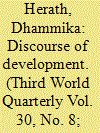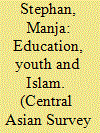| Srl | Item |
| 1 |
ID:
092924


|
|
|
|
|
| Publication |
2009.
|
| Summary/Abstract |
Like most other concepts in the social sciences, 'development' does not entail a commonly agreed upon meaning, context or programme of action. It is defined in different ways depending on the time, space, context, professional and organisational interests of the one who does the business of defining. The meaning of development has also undergone a remarkable transformation over the course of history from the Enlightenment concept of 'Progress' to encompass a great variety of human needs. This paper analyses how the contemporary discourse of development has reached a mature state and how it enables us to understand development in context- and culture-sensitive ways. It is now possible to determine what development means in different settings, and how to bring in material and non-material prosperity to people living in different contexts and cultures. After a theoretical discussion an empirical study in Sri Lanka is presented which attempts to arrive at a more refined context- and culture-sensitive definition of development. The paper argues that, in order to understand development at micro-settings, it is better to construct our own indexes of development rather than using global measures. It shows how the current state of the discourse of development can lend insights into construction of a development index.
|
|
|
|
|
|
|
|
|
|
|
|
|
|
|
|
| 2 |
ID:
101298


|
|
|
|
|
| Publication |
2010.
|
| Summary/Abstract |
This article attempts to explain the growing popularity of private religious lessons in urban Tajikistan from a cross-generational perspective. By instilling discipline and good 'morals', religious lessons serve as a powerful tool to socialize adolescent and morally vulnerable urban youth into the established social order. The increasing demand for religious instruction on the part of Muslim parents not only reflects the growing importance of Islam in Tajikistan, but also highlights the weaknesses of state education and the constraints on family upbringing in neo-local urban households. By attending religious classes, male and female youth have found a space for negotiating religious identities and for realizing their own abilities and ambitions. Given the socio-economic hardships of everyday life in the post-Soviet city, a turn to Islam can promote integration, recognition and social mobility, and offer an alternative route for urban youth to become 'adults'.
|
|
|
|
|
|
|
|
|
|
|
|
|
|
|
|